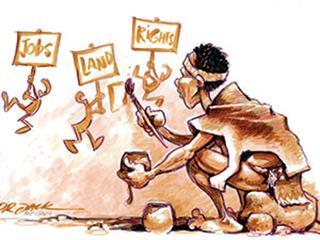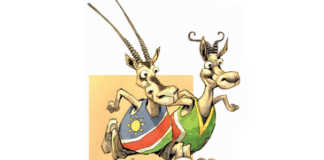
We support our government in removing a disgraceful legacy of a painful past. The San people came here before anyone else, and, with the help of God, put their signatures on the rocks. These signatures now speak louder for us than any words can. No one can take this away from us. Our unity is of great importance if we want to reverse the shameful legacy of the Natives Land Act of 1913.
How do you take people’s land from them? How do you dispossess someone living as peacefully as these people were?
To achieve this, the first visitors to our land changed the identity of the people they met. The 1652 Dutch Regime classified all Khoi, San, Korana, Nama and Griqua people as ‘Coloured’, and this was the start of the land dispossession.
We should not have to be reclaiming what was already ours to begin with. However, we are aware that we have to follow the government systems in place for these claims. Our forefathers were forcefully removed from their farms and rural land. They were then forced into townships, where they were not allowed to buy land, but could only rent it.
It was only when the current government came to power in 1994 that we could start buying our township properties and houses. However, we are still in the dark about claiming back the original land of our forefathers, and we hope that government is being honest about our being able to claim this land back.
Enormous losses
We have lost too much to even try to explain – our land, our livestock, our culture, our language, our way of life, our heritage sites, our historic landmarks, our forefathers’ farms, our identity, our first nation status.The Group Areas Act was brought about to make sure that we could not inherit our fathers’ farms. The Group Areas Act crammed us into townships, and if we did not obey this Act, we were jailed. Before 1994 there were more of our people in jail than any others.
It is now 19 years into democracy and it is so sad that 1994 brought no positive changes for our people, but simply another classification. We were classified as having been advantaged while living under apartheid and are now worse off than before. These days, in addition to not having our land, we are marginalised – in the workplace, on sports fields and in the business sector.
Now government says that we must talk to it because it’s listening. We’ve waited a long time for this. Make no mistake, we will talk to government – but it must then prove itself. Our people are ready to be transformed. Our 1994 is only coming to us now. Having our ‘Coloured’ classification removed will be a sign of the start of the return of our land. I say to all of our people: let us join in with government to allow this process to take its course. The ILO 169 Convention of the United Nations supports this move. But government must show us how serious it is. United we stand, divided we fall.
Government payroll
We want our land given back. We must be classified among the disadvantaged so that the doors of employment are opened for us. Our heritage must benefit us. Our minerals that are mined must have returns into our trusts. Government must set a budget aside to develop our people. Our youth must be developed and be given equal chances. The word ‘Coloured’ must be removed just like the other words that have been removed from our history.
Our claims must be honoured, starting in our townships to where our forefathers were forcefully removed from their land.
Our culture and our identity must be supported by government. And our traditional leaders must be placed on the government payroll. – Lloyd Philips
Adapted from a speech made by Raymond Trollip at the recent Khoi and San Indaba held in KZN.
The views expressed in our weekly opinion piece do not necessarily reflect those of Farmer’s Weekly.













